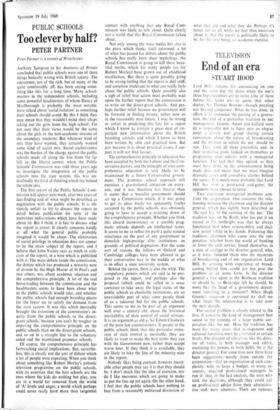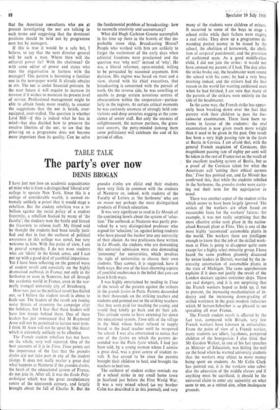End of an era
TELEVISION STUART HOOD
Lord Hill's reasons for announcing on one and the same day the dates when the eac's three top executives are to retire (one of them before his term) arc—to quote that other doctor, Sir Thomas Browne—though puzzling not beyond conjecture. What he has done, in effect, is to announce the passing of a genera- tion, the end of a particular tradition in BBC management. Greene. Adam and Gillard were (it is impossible not to lapse into an elegiac note) a closely knit group sharing certaia convictions about the nature of broadcasting and the manner in which the BBC should be run. They were all three journalists and, in their respective posts, looked on themselves as programme men—editors with a managerial function. 1 he fact that they agreed, as they must !lase done, to the announcement being made does not mean that we must imagine dramatic crises and convulsive clashes behind the scenes. It is much more probable that Lord Hill has won a protracted end-game; his opponents, have chosen to retire.
Two important managerial problems con- front the corporation. One concerns the rela- tionship between the chairman and the director general, which has rightly been described as 'the real key to the running of the enc.' The tradition was set by Reith, who has put it on record in his forthright way that be always functioned best when responsibility and deci- sion rested solely in his hands. Following this tradition, chairmen who came into the cor- poration. whether from the world of banking or from the civil service, found themselves in a state of tutelage to the director general, who, as it were, inducted them into the mysteries of broadcasting and of BBC organisation. Lord Hill, by arriving with experience of broad- casting behind him, could not but pose the problem in an acute form. Is the director general a free agent in the Reithean tradition or should he, as Beveridge felt he should, be more like the head of a government depart- ment reporting to a minister? When Hugh Greene's successor is appointed we shall see what shape the relationship is to take over the next decade.
The second problem is closely related to the first. It concerns the kind of management best suited to the running of a large public cor- poration like the BBC. Here the tradition has been for many years that n.magement and editorial functions must be cr,rnhined at certain levels. The director of television, like the direc- tor of radio, is both manager and editor, exercising his powers in both fields. So is the director general. For some time now there have been suggestions—mostly from outside the corporation—that an organisation of such com- plexity, with so large a budget, so many re- sources, required professional managers to run it; that, in the last analysis, the men who took the decisions, although they could call on professional advice from their administra- tive staff, were amateurs. There are rumours that the American consultants who are at present investigating the Bac are talking in such terms and suggesting that the dominant positions should be held not by programme men but by managers.
If this is true it would be a safe bet, I believe, to say that the next director general will be such a man. Where then will the editorial power lie? With the chairman? Or with some editor of power and status who runs the organisation in harness with the manager? This pattern is becoming a familiar one in the newspaper world. It already obtains in rm. The Bac is under financial pressure. In the near future it will require to increase its revenue if it wishes to maintain its present level of service. Professional management might be able to obtain funds more readily, to counter the suggestions that the Bac is lavish, over- equipped, over-staffed. The question is whether Lord Hill—if this is indeed what he has in mind—has also decided how to preserve the creative liberties of the BBC, to see that the price-tag on a programme does not become more important than its quality. Can he solve
the fundamental problem of broadcasting: how to reconcile creativity and accountancy?
What did Hugh Carleton Greene accomplish in his time up there in the bowels of that im- probable stone ship, Broadcasting House? People who worked with him are unlikely to forget the excitement of the early days when editorial freedoms were proclaimed and the question was 'why not?' instead of 'why'. He was a liberal reformer, open-minded, willing to be persuaded by reasoned argument, firm decision. His regime was based on trust and a view, shared with his chief executives, that broadcasting is concerned with the pursuit of truth. On the reverse side, he was unwilling or unable to purge certain notorious centres of obscurantism within the corporation—particu- larly in the regions. At certain critical moments he was curiously unaware of strongly held con- victions and deep anxieties nagging at the cons- cience of senior staff. But only the enemies of enlightenment, the narrow puritans, the grass- root censors, the petty-minded (among them some politicians) will celebrate the end of his period of office.







































 Previous page
Previous page